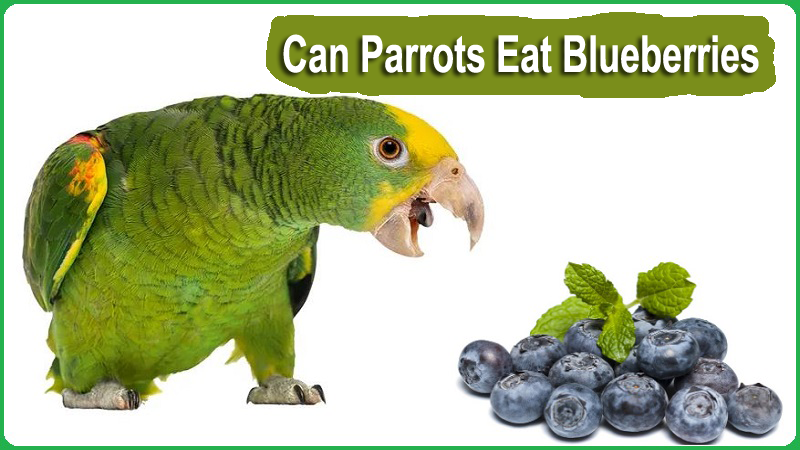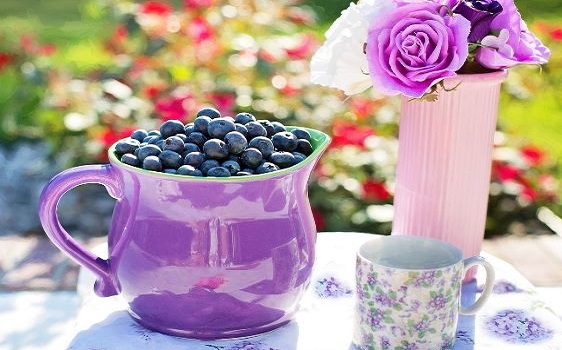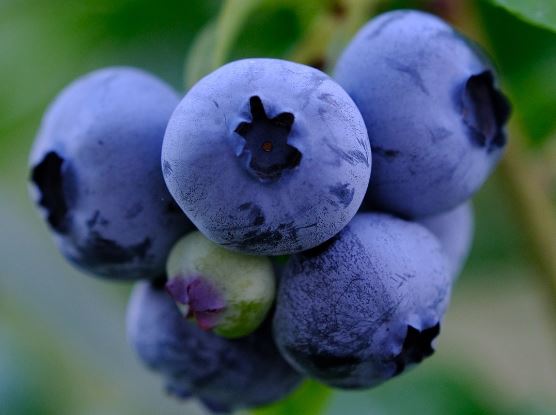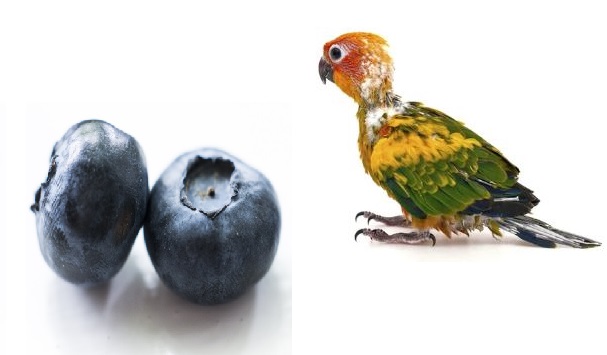As you know, parrots come in active birds. But, they have to require a regular nutrition to keep stay active. Blueberries are yummy and nutrition packed fruits, so most of people take enjoy eating. There commonly, a question comes in your mind that ‘Can parrots eat blueberries?‘ Are blueberries healthy foods for them? Let’s come now we will discuss on this with detail!
In short time, as per expert ‘Yes.‘ Parrots do like to eat blueberries, and you can add them in their diet. It can consider one of the most beneficial berries for them. But, like as with other foods, there are also several rules and restrictions about the quantity and quality of these blueberries.
Don’t skip in middle, because little knowledge is dangerous! Through this article, we will provide you complete guide about you need to know about feeding blueberries to your pet parrots in detail.
Are Blueberries Safe for Parrots?
Yes! Blueberries are safe for your parrots when fed in moderation. These blueberries contain highly vitamins C and K, antioxidants, and fiber. They can offer many health benefits such as immune support, antioxidant protection, and improved digestive health.
But, you should be keeping mind about their natural sugar content that can lead to obesity and related health problems if intake in large amount.
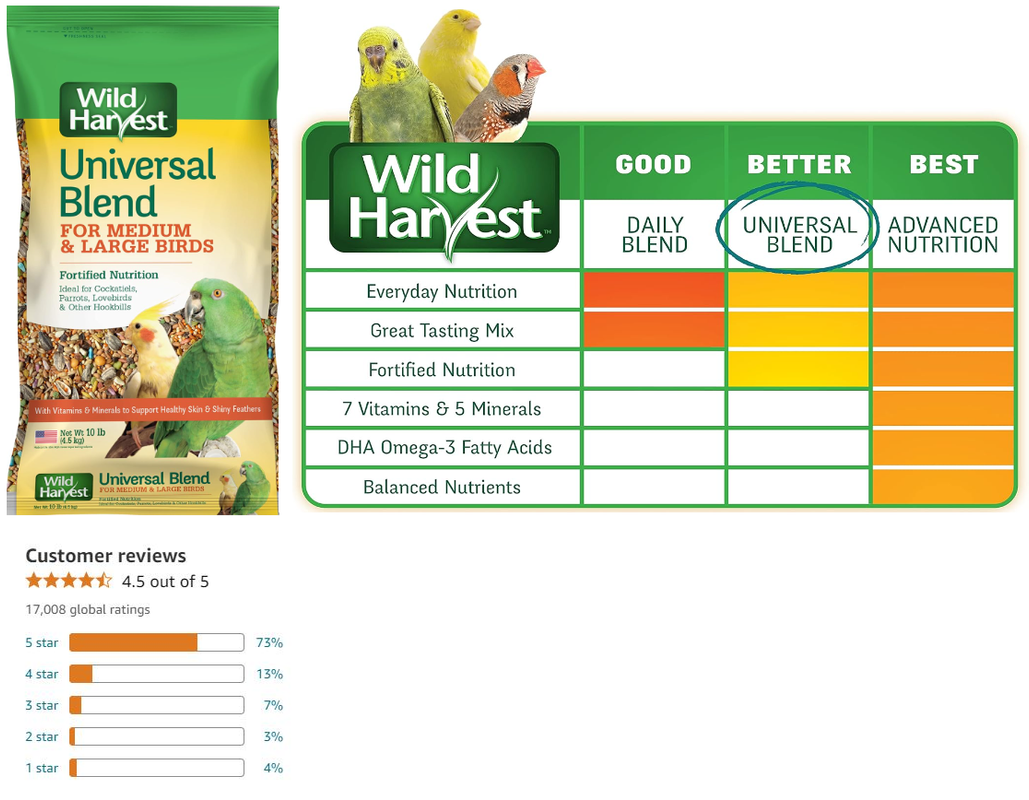
So, proper wash the berries thoroughly to remove any pesticide residues and minimize risk levels. Besides of this, cut blueberries into smaller sizes that can help prevent choking issue.
Nutritional Benefits of Blueberries for Parrots
Here, we will spread light on some of the key nutritional of blueberries for parrots:
Also Read: Can Parrots Eat Oranges? Benefits & Precautions
Vitamins
Blueberries are an excellent source of vitamin C that plays an essential role for boosting immune system.
This vitamin helps to product of collagen that essential for healthy skin, feathers, and wound healing.
Besides of this, vitamin C enhances iron absorption for preventing anemia.
Vitamin K plays the vital role in proper blood clotting. This is essential at that time, if your parrot gets injured.
Antioxidants
Anthocyanin is a type of antioxidant that produces the deep blue color of blueberries.
These compounds keep protect the cells in your parrot’s body from oxidative stress that caused by free radicals.
This neutralizes free radicals that support to overall well-health and longevity.
Blueberries are also packed with other antioxidants like flavonols and resveratrol that decrease inflammation and give protection from cell damage.
Dietary Fiber
Blueberries are enabled with dietary fiber that is essential for maintaining a healthy digestive system in parrots.
Fiber helps in smooth passage of food through the digestive tract; and keeps away from constipation and promoting regular bowel movements.
It also regulates the blood sugar levels that particularly beneficial for avoiding the obesity and diabetes.
Minerals
Manganese is crucial for metabolism that helping out in the conversion of proteins, carbohydrates, and fats into energy.
Manganese is also most essential for their bone developments. So, it is vital for a parrot’s skeletal well-health.
Blueberries also contain other important minerals like copper, iron, and potassium, but in fewer amounts.
Copper and iron contribute to make healthy red blood cells and keep away from anemia. Potassium keeps maintain proper fluid balance, muscle function, and nerve signals.
Low-Calorie Content
Blueberries also have calories, but in less amount. This can be considering a good treat for parrots without the risk of weight gain.
If, your parrots prone to obesity; then blueberries can be crucial for them, because they take enjoy a tasty snack without appending an excess calories to their diet.
Blueberries Nutritional Stats
Here are the key nutritional facts about blueberries for parrots, as following them:
Also Read: African Grey Parrot Diet and Nutrition in Captivity and Wild
| Nutrient | Amount Per 100g |
|---|---|
| Energy | 57 kcal |
| Protein | 0.7 g |
| Total Fat | 0.3 g |
| Carbohydrates | 14.5 g |
| Dietary Fiber | 2.4 g |
| Sugars | 9.7 g |
| Vitamin C | 9.7 mg |
| Vitamin K | 19.3 µg |
| Vitamin A | 54 IU |
| Calcium | 6 mg |
| Iron | 0.3 mg |
| Magnesium | 6 mg |
| Phosphorus | 12 mg |
| Potassium | 77 mg |
| Sodium | 1 mg |
| Water | 84 g |
Risks of Feeding Blueberries to Parrots
Generally, blueberries are safe and beneficial for parrots when allow in moderation, but there are several potential risks to be aware of:
High Sugar Content
Blueberries have natural sugars in large amount. So, it can make reason of obesity, fatty liver disease, and diabetes in parrots if intake in excess.
Pesticide Residues
Conventionally grown blueberries may consist the pesticide residues that potentially causing health issue. So, thoroughly wash the berries or choose organic options to minimize this risk.
Choking Hazard
Whole blueberries can also lead a choking risk, especially for smaller parrot species. So, should be offer them into smaller pieces that can help prevent choking.
Digestive Upset
Some parrots can get digestive issues, such as diarrhea or loose stools; if they eat too many blueberries. So, introduce them gradually and always keep monitor for any bad reactions.
Can Parrots Eat Blueberry Skin?
Yes! Parrots can eat easily blueberry skin. Blueberry’s skin is safe side; and having nutritious such as antioxidants, fiber, and vitamins that can benefit your parrot’s health.
Always should wash the berries thoroughly to discard any pesticide residues, especially if they are not organic.
Their skin also provides some extra fiber and nutrients that contribute to a well-balanced diet. Whenever, you introduce any new foods gradually, then must be monitoring your parrot for any adverse reactions.
What About Blueberry Juice to Parrot?
Yes! Parrots can safely intake blueberry juice as an occasional treat. Here are the key points about feeding blueberry juice to parrots:
Parrots are capable to drink blueberry juice, either store-bought or homemade by crushing fresh blueberries to extract the juice. But, blueberry juice should only be allowing in moderation, because it is high in natural sugars.
Blueberry juice also consist many beneficial vitamins, minerals and antioxidants to your parrots. But, it has the fiber in fewer amounts. So, don’t replace it into balanced diet of pellets, vegetables, and limited whole fruit.
Can Parrots Have Blueberry Seeds?
Yes! Parrots can safely eat blueberry seeds along with the rest of the blueberry. The seeds don’t have any toxins that can be dangerous to parrots.
But in reality, blueberry seeds also consist some helpful nutritional for parrots. They are in less quantity of healthy fats, protein, fiber, and minerals.
Feed blueberry seeds are beneficial in moderation as part of a balanced diet. But, they should not make up a main part of the parrot’s daily intake.
Larger parrots are capable to easily consume the whole blueberry, including the seeds, but smaller parrots may get some choking issue.
Are There Pesticides in Blueberries?
Of Course! Conventionally grown blueberries have pesticide residues. Commonly, pesticides are using in agriculture to give protection crops from pests and diseases.
Also Read: Can Parrots Eat Bananas? Yes or Not
Although, these chemicals help to get bountiful harvest, but may remain on the surface of fruits. If, parrots get expose pesticide that can lead several health issues like as digestive and toxicity.
So, we recommend the thoroughly wash blueberries before feeding them to your parrot. Apply a mixture of water and a splash of vinegar to remove more pesticide residues.
Alternatively, feeding organic blueberries to parrot reduce the likelihood of pesticide exposure.
Homemade Blueberry Treats for Parrots
For a special treat, blueberries can be incorporated into homemade parrot snacks. Here is a simple recipe for blueberry muffins:
Ingredients
- 1 cup whole wheat flour
- 1 tsp baking powder
- 1/4 cup unsweetened applesauce
- 1/4 cup water
- 1/2 cup fresh or frozen blueberries
Instructions
- Preheat oven to 350°F. Grease a mini muffin tin.
- In a bowl, mix together the flour and baking powder.
- Add the applesauce and water and stir until just combined.
- Gently fold in the blueberries.
- Insert the batter into the ready muffin tin with spoon, filling each cup should be 3/4 full.
- Take 15-18 minutes for baking until a toothpick entered comes out totally clean.
- Allow to cool completely before serving to your parrot.
Can Baby Parrots Eat Blueberries?
Yes! Baby parrots can also take enjoy of eat blueberries in moderation. There are a few important considerations when feeding blueberries to young parrots:
Portion sizes should be much smaller for baby parrots as compared to adult birds. Blueberries should make up no more than 5-10% of a baby parrot’s total daily intake.
Over-feeding sugary fruits like blueberries can arise digestive upset in growing birds. So, introduce blueberries slowly and in small amounts at first; until baby parrot’s digestive system to adjust.
Do Parrots Eat Dried Blueberries?
Yes! Your parrots can have dried blueberries as an occasional treat. Dried blueberries also retain most of their nutritional benefits, including vitamins, antioxidants, and fiber.
Dried fruits are more concentrated in sugars and calories as compared to fresh ones. Therefore, allow dried blueberries sparingly to avoid excessive sugar intake. Otherwise, it can create the obesity and other health issues in parrots.
Keep ensure that dried blueberries don’t contain any added sugars or preservatives. As with any new food, introduce dried blueberries gradually and monitor your parrot behavior.
Potential Mess and Discoloration
Feeding blueberries to parrots can potentially get mess and discoloration, mainly due to their juicy nature and dark pigment. When parrots intake blueberries, their beaks and feathers may become stained temporarily.
Besides of this, the fruit’s moisture content can contribute to droppings that are darker or more liquid than usual. You can offer blueberries in a designated feeding area to manage this,. This is easy to clean, such as on a washable tray or in a bowl.
Keep regularly clean and replace bedding or cage liners. It helps maintain cleanliness and hygiene in parrot’s environment.
How Many Blueberries Should You Feed?
The amount of blueberries to feed your parrot depends on its size and dietary needs.
As a general guideline, a small to medium-sized parrot can be given 1-2 blueberries as a treat a few times per week. Larger parrots may safely intake 3-4 berries on occasion.
You must keep monitoring your parrot’s overall calorie intake, because blueberries contain natural sugars.
How Do You Serve Blueberries to Parrot?
Here are some ways to serve blueberries to parrots:
Also Read: Can Parrots Eat Grapes with? Yes or Not
Wash Thoroughly: Before serving, wash blueberries under running water to remove any pesticide residues. Organic blueberries are a safer option if available.
Cut into Small Pieces: For smaller parrot species, consider cutting blueberries into smaller pieces to prevent choking hazards. This also makes it easier for them to handle and consume.
Offer in Moderation: Blueberries should be given as a treat and not a primary part of their diet. A few berries a couple of times per week is sufficient.
Monitor Consumption: Watch your parrot’s intake to prevent overeating. This can lead to obesity due to the fruit’s sugar content.
Incorporate into Balanced Diet: Include blueberries as part of a varied diet that includes pellets, fresh vegetables, and other fruits to ensure nutritional balance.
Clean Feeding Area: Serve blueberries in a clean dish to maintain hygiene.
FAQs (Frequently Asked Questions)
Are Blueberry Leaves or Stems Safe for Parrots?
You should avoid feeding blueberry leaves or stems to parrots. Typically, they are not eatable and may cause digestive issues.
How Do I Know If Blueberries Are Fresh to Feed My Parrot?
Fresh blueberries should be firm, plump, and deep blue in color. Never, feeding blueberries to parrot that are mushy, moldy, or off smell.
How Many Blueberries Can I Feed My Parrot?
Blueberries should be fed in moderation. A few blueberries a couple of times a week is sufficient as part of a balanced diet. Overfeeding can create the digestive issues due to their sugar content.
Can Parrots Eat Frozen Blueberries?
Yes! Parrots can eat frozen blueberries. But, it’s best to thaw them first.
Final Remarks
As result of this post, blueberries are safe stuff for your parrots to eat, but allowed in moderation. Keep remember that blueberries aren’t mandatory for your beloved parrots. Therefore, if your parrots don’t show interest in eating them, you can serve them with mix other types of fruit.
Also Read: Can Parrots Eat Strawberries? Should Be Known
If this post is informative and helpful for you, then please share it along with your friends, family members, pet lovers or relatives over social media platforms like as Facebook, Instagram, Linked In, Twitter, and more.
Do you have any experience, tips, tricks, or query regarding on this? You can drop a comment!
Have a Nice Day!!

